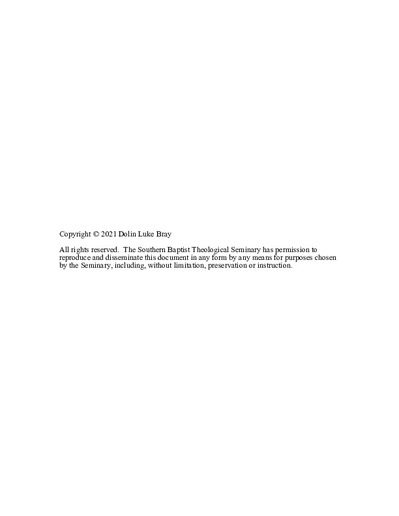Testing the Spirits: A Biblical Assessment of the Islamic Jibril
Abstract
The purpose of this dissertation is to assess the nature and character of the Islamic representations of Jibril by means of biblically derived criteria for identifying spiritual beings and by comparing the representations of the Islamic Jibril with the representations of the biblical Gabriel. Gabriel is one of two angels named in canonical Scripture. He stands in God’s presence and serves as God’s messenger. He is only mentioned by name in the book of Daniel and the Gospel of Luke. Similarly, Jibril serves a vital role in Islam. Muhammed is believed traditionally to have received the words contained in the Qur’an by means of Jibril’s dictation. The origin and allegiance of this spiritual being is significant for both Christianity and Islam. While the biblical narratives supply readers with multiple instances, few texts give thorough investigation regarding spiritual beings’ origins, roles, personalities, and specific behaviors. Taken individually, these descriptions do not provide the reader with a comprehensive understanding about spiritual beings; however, if these instances are examined in conjunction with one another and properly analyzed, they provide a paradigm by which one can compare and contrast spiritual beings outside Scripture in hopes of determining a specific spiritual being’s identity, allegiance, and purpose.
The purpose of this data analysis research was to develop a biblical instrument for identifying spiritual beings (BIISB), in particular the angel Gabriel (Jibril), as revealed in both biblical and select Islamic texts. The data extrapolated through this research method was used to infer specific character traits, behavioral qualities, and informational themes that are consistent with angelic beings in both the Old and New Testaments. The inferred qualifications were then used to assess texts specifically discussing Gabriel from both traditions. Gabriel and Jibril were analyzed through textual comparative analysis. While the figures shared multiple qualitative similarities, the comparison also revealed noticeable qualitative disparities between them as well. Based upon the critical analysis provided by the biblical instrument for identifying spiritual beings and the thorough comparison of Gabriel and Jibril, the apparent dissimilarities displayed by these two figures are irreconcilable. Jibril’s embodiment of non-angelic qualities coupled with the stark contrast of his message do not coincide with the descriptions of the biblical Gabriel or the content of his messages.

